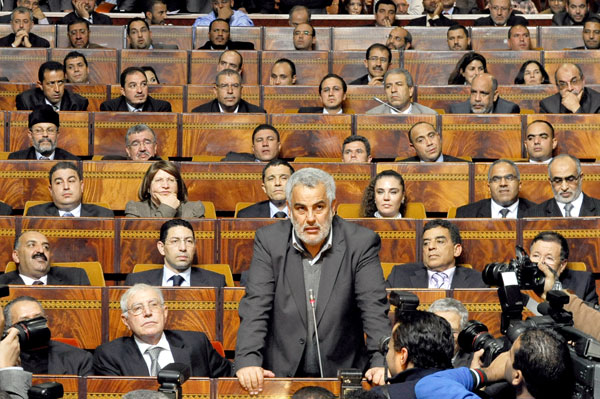- Washington “follows with interest” Morocco’s openness onto Africa (John Kerry)Posted 11 years ago
- The trial of South African Paralympic champion Oscar Pistorius opened in Pretoria on Monday.Posted 11 years ago
- USA welcomes efforts of King Mohammed VI in MaliPosted 11 years ago
- Egypt’s population reaches 94 millionPosted 11 years ago
- Mugabe celebrates his 90thPosted 11 years ago
- Moroccan Monarch to Build a Perinatal Clinic in BamakoPosted 11 years ago
- King Mohammed VI handed a donation of bovine semen for the benefit of Malian breeders.Posted 11 years ago
- Moroccan King’s strategic tour to Africa: Strengthening the will of pan African Solidarity and stimulating the south-south cooperation mechanisms over the continentPosted 12 years ago
- Senior al-Qaida leader killed in AlgeriaPosted 12 years ago
- Libya: The trial of former Prime Minister al-Baghdadi AliPosted 12 years ago
The Successful story of Morocco: Islamic party wins parliamentary elections
 Morocco’s moderate Islamist Justice and Development Party (PJD) has won the most seats in Friday’s parliamentary elections, final results confirm.
Morocco’s moderate Islamist Justice and Development Party (PJD) has won the most seats in Friday’s parliamentary elections, final results confirm.The interior ministry said the PJD took 107 out of 395 seats, giving it the right to lead a government.
It’s likely coalition partner, the nationalist Istiqlal party, came second, with 60 seats.
The poll is part of reforms initiated King Mohamed VI who has expressed a strong will for completing the engineering of the parliamentary monarchy.
“This is a clear victory, but we will need alliances in order to work together,” PJD secretary-general Abdelilah Benkirane told the AFP news agency after the official results were announced.
Under a new constitution adopted in July, King Mohamed must now appoint the prime minister from the party which wins the most seats, rather than naming whomever he pleases.
But the king still has the final say on issues of defense, security and religion.
Morocco’s current Prime Minister, Abbas Al Fassi, said on Saturday his Istiqlal party was ready to enter into a coalition with the PJD.
It comes a month after the moderate Islamist Ennahda party won elections in nearby Tunisia.
The PJD has said it will promote Islamic finance. However, it has avoided focusing on issues such as alcohol and headscarves for women, in a country which attracts large numbers of Western tourists.
The Interior Ministry said 45.4% of the electorate had turned out to vote.
About 13.5 million Moroccans are eligible to vote. Although the turnout was an improvement on the 37% who took part in the 2007 election.
The pro-reform February 20 movement, responsible for the protests staged since February, had called for a boycott of the vote.
